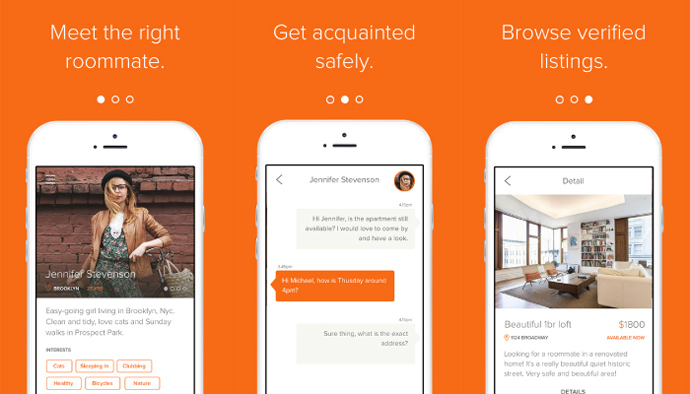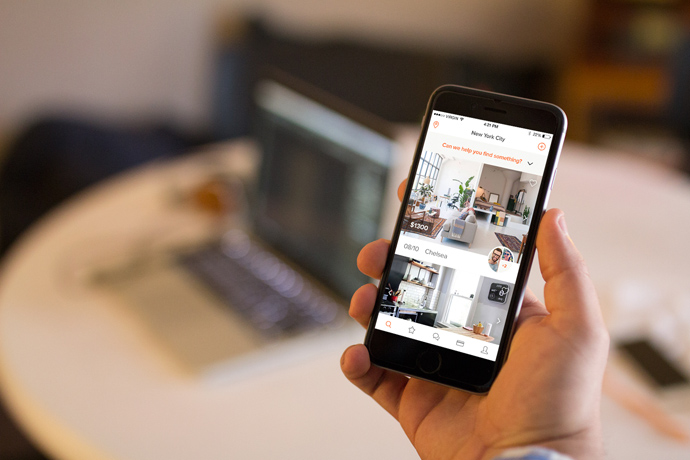The Roommate Search Revisited: Roomi Shakes Up The Co-Living Scene
Most people who move to New York City from another country would probably want to return home after having all of their belongings stolen by a roommate. Not Ajay Yadav, the self-proclaimed “troublemaker-turned doer, people person and dreamer,” who created Roomi and is now its CEO. After coming home to an empty room one day, all of his belongings taken by his missing roommate, Yadav tells Wall Street Insanity that he realized he had experienced “an incredible learning opportunity.”
First, Yadav identified the source of the problem: “The hectic nature of the apartment search in a city with vacancy rates barely at one percent meant that I had sacrificed feeling secure and comfortable at home for the sake of jumping on the first place I could afford.” Then, after realizing that his friends felt similarly uncomfortable about apartment and roommate hunting in New York, he conceptualized Roomi. Roomi, he says, was his effort to focus on “increasing safety, simplifying the search experience and helping users make the most informed decisions.”
Roomi 101.
Roomi is an iOS (and soon to be Android) compatible app that you may not have heard of, unless you live in New York City or San Francisco. But it’s growing fast, with plans to expand to Los Angeles within the next few months. Before you know it, Roomi may be the greatest tool in your own, personal roommate search.
Yadav describes Roomi as a roommate-finding service and apartment hunting app in one, intended to “make the experience simpler, quicker, and less stressful for our customers.” To some users, it may seem most like a dating app with a practical purpose. It’s currently free to use, and builds potential roommate profiles via information from Facebook, Instagram, and LinkedIn. Its social media connectivity also enables the app to verify users, a key security measure for the process of connecting complete strangers.

Image courtesy of Roomi
The crucial and unique feature of Roomi is its security process. Although it has an aesthetically appealing and easy-to-use interface, it also seamlessly integrates safeguards that keep you, the user, from jeopardizing your own privacy. For example, properties are listed “via an approximate map location rather than exact street address,” explains Yadav.
Better yet, Roomi enables users to find out more about one another in a safe environment. Not unlike many popular dating apps, Roomi has an in-app chat available so users can get their questions answered while protecting personal contact information. Through this communication, users can decide if they will be “compatible roommates.” Yadav also encourages anyone using the app to report suspicious activity, which his team will investigate immediately. Customer service and user feedback are priorities, Yadav explains. “We’ll address any concerns and continue to improve.”
Roomi gets rolling.
Roomi launched out of beta in New York city in June 2015. It quickly became the number one app in the Apple Store for finding roommates. But it wasn’t an instant success. Although the app fulfills a tremendous need (Yadav explains that people in New York spend, on average, about 40 percent of their income on rent), it still had hurdles to overcome.
From the beginning, Yadav formed a grassroots team that the Roomi founder says had to “hit the pavement.” Ultimately, they “helped us gain 120,000 users in NYC alone.” New York City is “admittedly a tough market for most businesses,” Yadav confesses. That’s why he “read everything [he] could about potential investors and advisors, and pinpointed the ones who could add the most strategic value to Roomi.” From there, he used his own tenacity and persistence to turn “no’s” into “maybes” into “yes’s.” His hard work paid off, literally, as he has since raised over $2 million in funding to further grow the company.
The next-hardest part was finding initial users. The Roomi team took the app from New York to San Francisco to continue to build its base. It launched in San Francisco on October 15th of this year, where it now enjoys a few hundred listings in the city. Yadav expects it to “grow exponentially.” As the app grows, monetizing features will be implemented to add to the experience for users, and create revenue for Roomi.
The trendiness of co-living.
Yadav’s ambitions for his app are, of course, banking on the continued need people will have for roommates. It’s unlikely that co-living will go away. Many millennials have started a sort of “trend,” living with roommates well out of college as they gravitate toward big cities with high rent and tough-to-stretch salaries. They have started to re-think the traditional lifestyle, prioritizing both financial savvy and personal independence.
But this isn’t just a trend that will go away as millennials age, move out of big cities, and occupy the suburbs. “Affordable rent is a global need,” Yadav observes. “And people of all ages are rethinking the traditional housing model. They’re gravitating towards communities. For example, seniors are not the stereotypical roommate demographic, but many … are seeking out roommates as an alternative to assisted living.”
So while Millennials may be the ones feeling the financial “pinch” of big city life, there’s a practical application for the app for essentially anyone. By saving money via a roommate, people of all ages can have more disposable income left for saving or enjoying the city they live in.
For Yadav, his app is all about helping people. He explains that he simply wants to enable people to “live happier in their homes and have more rewarding engagement within their communities.” In other words, his goal is to help people avoid the very experience he had when he first moved to America.
Moving forward, Yadav sees Roomi expanding to cities with a high cost of living, as well as those with more affordable rent. No matter the location, there is always a benefit to reducing rent and finding someone else to share the financial burden. There’s also something to be said for having someone to live with in a new and unfamiliar environment — especially if you’ve gotten to know them and forged a positive relationship beforehand. Roomi facilitates this process.
As the app’s user base expands, be sure to keep an eye out for Roomi in your city. You never know when it will be time to move again. And this time, you won’t have to worry about a roommate who could steal your stuff.








































